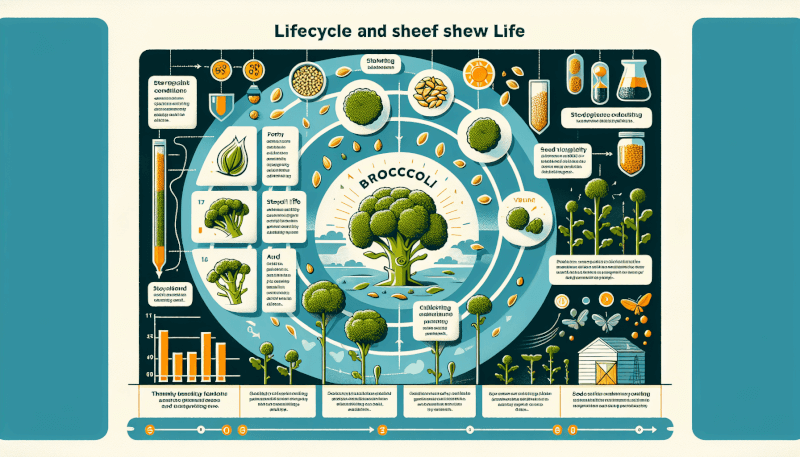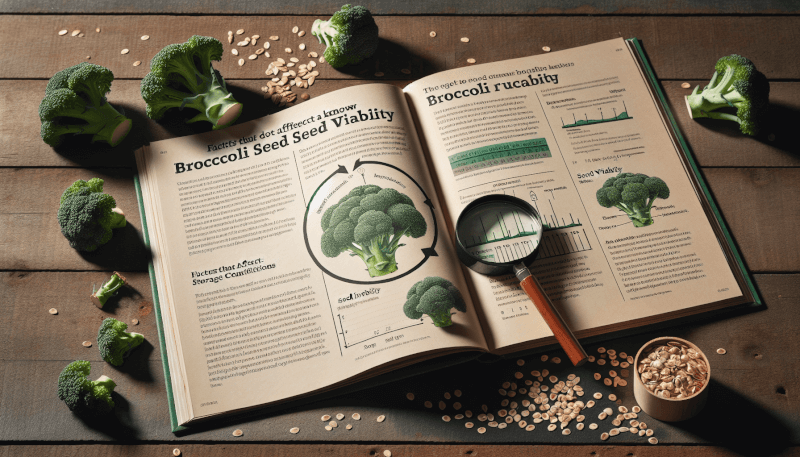👋 Click the mic button to talk to Alfred, the Todd's Seeds Gardening/Sprouting Expert – Feel free to ask him anything!
Ask Virtual Todd Anything - Click the Mic
Have you ever wondered how long broccoli seeds remain viable? Whether you’re an experienced gardener or just starting out, understanding the lifespan of broccoli seeds is crucial for successful cultivation. In this article, we’ll explore the fascinating world of broccoli seeds and uncover how long they can be stored while maintaining their ability to grow into healthy broccoli plants. From storage techniques to factors that can affect their shelf life, we’ll provide you with all the information you need to ensure your broccoli seeds stay fresh and ready for planting when the time comes. So, let’s dive in and discover the secrets behind the longevity of broccoli seeds!

Factors Affecting Broccoli Seed Shelf Life
When it comes to broccoli seed shelf life, there are several important factors to consider. Understanding these factors can help you ensure that your broccoli seeds remain viable for as long as possible, increasing the chances of successful germination and healthy plant growth. The key factors that affect the shelf life of broccoli seeds include seed viability, storage conditions, seeds’ age, and genetic factors. Let’s explore each of these factors in detail.
Seed Viability
Seed viability refers to the ability of a seed to germinate and grow into a healthy plant. It is an essential factor to consider when determining the shelf life of broccoli seeds. An easy way to understand seed viability is by testing it. Seed viability testing involves germinating a sample of seeds under controlled conditions and determining the germination rates. The higher the germination rate, the more viable the seeds are. It is recommended to conduct regular seed viability tests to ensure that you are using seeds with high germination rates.
Storage Conditions
The storage conditions play a crucial role in maintaining the quality and viability of broccoli seeds. Some key factors to consider when storing broccoli seeds are temperature, humidity, light exposure, and air circulation. Optimal storage conditions are essential to prevent premature deterioration of the seeds.
Maintaining a cool and consistent temperature is vital for prolonging seed shelf life. Ideally, broccoli seeds should be stored in a cool and dry environment, with temperatures ranging between 32-41°F (0-5°C). High temperatures can reduce the seeds’ viability and shorten their shelf life significantly.
Humidity levels should also be carefully controlled to prevent moisture damage to the seeds. It is recommended to store broccoli seeds in a low-humidity environment, preferably below 50% relative humidity.
Exposure to light can also impact seed viability. To minimize light exposure, store broccoli seeds in opaque containers or in a dark location to protect them from both natural and artificial light sources.
Lastly, adequate air circulation is crucial to prevent the build-up of moisture around the seeds. Proper ventilation and storage containers that allow for air exchange help to maintain optimal conditions for seed storage.
Seeds’ Age
The age of broccoli seeds is another factor that affects their shelf life. Fresh seeds generally have higher viability and germination rates compared to aged seeds. Over time, the vitality of seeds gradually declines, leading to reduced viability and germination rates.
It is important to note that the expected shelf life of broccoli seeds can vary depending on the storage conditions mentioned earlier. However, on average, broccoli seeds can remain viable for around two to three years if stored properly. It is always a good practice to keep track of the age of your seeds and use them within a reasonable timeframe to maximize their viability.

Genetic Factors
The genetic makeup of broccoli seeds can also impact their shelf life. Varietal traits and breeding practices play a role in determining the longevity of seeds. Some varieties may naturally have a longer shelf life than others due to specific genetic traits.
Breeding practices can also influence the longevity of seeds. Selecting and breeding plants for improved seed longevity can result in seeds with increased vitality and longer shelf life. Seeds from plants bred specifically for seed longevity are likely to have better viability and germination rates compared to seeds from less specialized breeding programs.
Signs of Seed Deterioration
It is essential to be able to recognize signs of seed deterioration to ensure that you are using viable broccoli seeds. Some common indicators of seed deterioration include discoloration, mold or fungus growth, insect infestation, weakened embryos, and poor germination rates.
Discoloration is often a visible sign that the seeds have started to deteriorate. If the seeds appear significantly darker or have a dull appearance, it is likely that their viability has been compromised.
Mold or fungus growth on the seeds or in the storage container is a clear sign of moisture damage. Moldy or fungus-infested seeds are unlikely to germinate and should be discarded.
Insect infestations can also negatively impact seed viability. Look for signs of insect activity, such as holes in the seeds or the presence of insect larvae. If you notice any insect infestation, it is best to discard the affected seeds.
Weakened embryos can be identified through careful observation. If the embryos appear shriveled, discolored, or show signs of damage, it indicates that the seeds are no longer viable.
Finally, poor germination rates are a strong indicator of seed deterioration. If a significant percentage of the seeds fail to germinate, it is likely that their viability has been compromised.
Extending Broccoli Seed Shelf Life
To maximize the shelf life of broccoli seeds, there are several steps you can take during the harvesting, drying, storage, and treatment processes.
Proper Harvesting Techniques
Proper harvesting techniques are crucial to ensure that the seeds are mature and of good quality. Identify mature broccoli plants by looking for signs such as fully developed florets and dry, browned flowerheads. Timing is also important, as harvesting too early or too late can affect seed quality. Once the plants have matured, extract the seeds carefully and clean them by removing any plant debris.
Effective Seed Drying
Seed drying is a critical step in preserving seed viability. Properly dried seeds have a lower risk of mold or fungus growth and can be stored for longer periods. Ideally, seeds should be dried in a well-ventilated area with low humidity. Air drying is generally the preferred method for drying broccoli seeds, as it allows for gradual moisture loss without subjecting the seeds to excessive heat or mechanical stresses.
Appropriate Seed Storage
Choosing the right storage conditions is essential for extending the shelf life of broccoli seeds. Store the seeds in a cool, dry, and dark place to minimize moisture uptake and prevent premature deterioration. Opaque containers or seed packets can provide protection against light exposure. Additionally, ensure proper air circulation by using breathable storage containers or by periodically opening the containers to allow for air exchange.
Seed Treatment Methods
Seed treatment methods can also help extend the shelf life of broccoli seeds. Seed priming is one such method that involves pre-soaking the seeds in water or a plant growth regulator solution. This process can enhance seed germination rates and improve seedling vigor.
Seed pelleting and seed coating are other treatment methods that involve coating the seeds with a protective material. These coatings can provide added protection against moisture, pathogens, and physical damage, increasing the seeds’ viability and shelf life.
In conclusion, understanding the factors that affect broccoli seed shelf life is essential for ensuring successful germination and healthy plant growth. Factors such as seed viability, storage conditions, seeds’ age, and genetic factors all play a role in determining the longevity of broccoli seeds. By implementing proper harvesting techniques, effective seed drying methods, appropriate seed storage, and seed treatment methods, you can maximize the shelf life of your broccoli seeds and increase the chances of successful gardening endeavors.